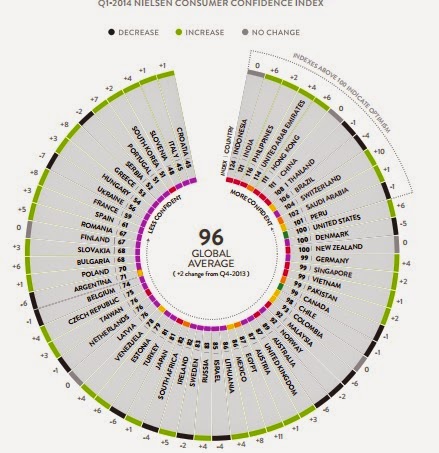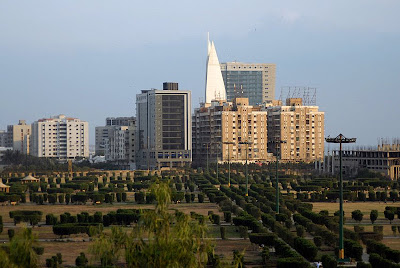PakAlumni Worldwide: The Global Social Network
The Global Social Network
Confident Consumers Push Pakistan Eid Sales Up by Double Digits
Nielsen, a global provider of data on consumers, reports that Pakistan consumer confidence has held steady at 99 for two consecutive quarters. This compares favorably with consumer confidence figures which declined over the previous quarter in the overall Middle East/Africa region. Among the region, UAE led the way for Middle East/Africa consumer confidence with an index of 109, a decline of five points from first-quarter 2014. Egypt (81) reported a drop of six points compared to the first quarter. South Africa posted the only regional confidence increase, climbing three points to 85, and confidence held steady in Saudi Arabia (102).
 |
| Global Consumer Confidence Index Report. Source: Nielsen |
More than half (56%) of Middle East/ Africa respondents in Nielsen consumer surveys viewed their personal finances in a positive light which held steady from the first quarter. In Pakistan, 59 percent of the respondents believed the state of their finances was good or excellent, up from 57 percent in the first quarter of this year.
“Pakistani consumers are generally optimistic as seen by mostly high consumer confidence scores over the last three years. However, a score of 99 in the first as well as the second quarter of this year, is the highest we’ve seen since the second quarter of 2011,” said Mustafa Moosajee, Managing Director, Nielsen Pakistan. “This reflects the overall mood in the country, especially relating to economic conditions. The economy is showing signs of recovery but macro challenges remain.”
Pakistan's Nielsen consumer confidence index of 99 is just below 100, a level that indicates optimism. Countries at or above 100 are: China (111), India (121), Indonesia (124), UAE (114), Philippines (111), Thailand (108), Brazil (106), Switzerland (104), Saudi Arabia (102), Peru (101), United States (100), Denmark (100) and New Zealand (100).
Consumer spending in Pakistan has increased at a 26 percent average pace the past three years, compared with 7.7 percent for Asia, according to data compiled by Euromonitor International, a consumer research firm. Pakistan's rising middle class consumers in major cities like Karachi, Lahore and Islamabad are driving sales of international brand name products and services. Real estate developers and retailers are responding to it by opening new mega shopping malls such as Dolmen in Karachi and Centaurus in Islamabad.
 |
| Dolmen City, Clifton, Karachi |
http://edition.cnn.com/video/#/video/world/2013/04/01/mohsin-bristi...
Pakistan has continued to offer much greater upward economic and social mobility
to its citizens than neighboring India over the last two decades. Since 1990, Pakistan's middle
class had expanded by 36.5% and India's by only 12.8%, according to an ADB report titled "Asia's Emerging Middle Class: Past, Present And ...
.
Dolmen Mall Clifton Featured on CNN from DHAToday on Vimeo.
Rising consumer is good but not sufficient to boost economic growth to meet the needs of growing population. What Pakistan requires badly now is significant new investments, both foreign and domestic, to overcome the ongoing energy crisis and rejuvenate the manufacturing sector.
Related Links:
Haq's Musings
Upwardly Mobile Pakistan
Educational Attainment in Pakistan
Foreign Visitors to Pakistan Pleasantly Surprised
Pakistan's Infrastructure and M2 Motorway
India Pakistan Comparison 2011
Resilient Pakistan Defies Doomsayers
Branchless Banking Responds to Pakistan Floods
Pakistan's Rural Economy Recovering
Pakistan's Growing Middle Class
Pakistan is Too Big to Fail
FMCG Consumption Boom in Rural Pakistan
Pakistan Visits Open Indian Eyes
Twitter Feed
Live Traffic Feed
Sponsored Links
South Asia Investor Review
Investor Information Blog
Haq's Musings
Riaz Haq's Current Affairs Blog
Please Bookmark This Page!
Blog Posts
Pakistani Prosthetics Startup Aiding Gaza's Child Amputees
While the Israeli weapons supplied by the "civilized" West are destroying the lives and limbs of thousands of Gaza's innocent children, a Pakistani startup is trying to provide them with free custom-made prostheses, according to media reports. The Karachi-based startup Bioniks was founded in 2016 and has sold prosthetics that use AI and 3D scanning for custom designs. …
ContinuePosted by Riaz Haq on July 8, 2025 at 9:30pm
Indian Military Begins to Accept Its Losses in "Operation Sindoor" Against Pakistan
The Indian military leadership is finally beginning to slowly accept its losses in its unprovoked attack on Pakistan that it called "Operation Sindoor". It began with the May 31 Bloomberg interview of the Indian Chief of Defense Staff General Anil Chauhan in Singapore where he admitted losing Indian fighter aircraft to Pakistan in an aerial battle on May 7, 2025. General Chauhan further revealed that the Indian Air Force was grounded for two days after this loss. …
ContinuePosted by Riaz Haq on July 5, 2025 at 10:30am — 5 Comments
© 2025 Created by Riaz Haq.
Powered by
![]()

You need to be a member of PakAlumni Worldwide: The Global Social Network to add comments!
Join PakAlumni Worldwide: The Global Social Network